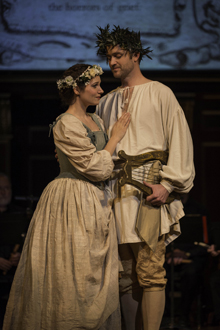
Aaron Sheehan played the title role and Mireille Asselin was Euridice in Boston Early Music Festival’s production of Monteverdi’s Orfeo. |
There's a shiny new band in town, conductor Benjamin Zander's Boston Philharmonic Youth Orchestra, a 117-member ensemble consisting of New England players from 12 to 21. The inaugural concert nearly sold out Symphony Hall for an auspicious debut.Zander opened with Beethoven's celebratory Egmont Overture, part of his incidental music for a production of Goethe's play about heroic resistance. The opening bars gave us the lay of the land — Symphony Hall reverberated with excitement and the rich, dark sound of the strings, refined winds and brass, and vigorous, alert, pinpoint percussion.
Zander, who's led the Boston Philharmonic since 1979 and is completely identified as its music director, made the unusual gesture of not conducting every work on the program. The next piece was Elgar's Cello Concerto, with guest star 30-year-old cellist and 2011 MacArthur-grant winner Alisa Weilerstein, whose impressive first recording for her new label, Decca, is of the Elgar and, heroically, the Elliott Carter Cello Concerto under Daniel Barenboim (there's a terrific YouTube video of her meeting with Carter at his New York apartment last July to work on his concerto). Decades ago Zander led a memorable Elgar with another brilliant young cellist, Yo-Yo Ma. But this time, Zander, who has been one of the American musicians most closely associated with the "El Sistema" program for young musicians in Venezuela, handed the baton over to Rafael Payare, a 32-year-old prize-winning Venezuelan conductor from the El Sistema program, assistant to Gustavo Dudamel and Claudio Abbado for the renowned Simón Bolívar Orchestra (and, word has it, Weilerstein's romantic partner).
Elgar was 62 (the combined age of Weilerstein and Payare) when he completed his achingly nostalgic concerto, and maybe this concerto needs someone in charge with the perspective of age. Payare is clearly a gifted, refined musician, but unlike Zander and Barenboim, he seemed to regard this job as providing a showcase for Weilerstein rather than allowing the orchestra to play a more interactive role. And Weilerstein, unlike what she does on her recording under Barenboim, seemed more concerned with playing notes — gorgeous notes (on her 18th-century William Forster cello) — than connecting them, than exploring Elgar's profound emotional narrative through an ongoing, continuous musical line. (She also seemed a little too engaged with sweeping her silky long hair out of her eyes. "That girl needs a barrette," someone commented during the intermission.)
The concert ended with Zander returning for a triumphant performance of Richard Strauss's autobiographical tone poem Ein Heldenleben ("A Hero's Life"), a technical minefield for even the greatest orchestras — with Strauss quoting himself in his depiction of his war with the philistines (especially critics), vividly captured by the nastiest winds. Concertmaster Hikaru Yonezaki, a 17-year-old senior at Newton South, was astonishing in her extended bravura violin solo characterizing — embodying — Strauss's beloved and challenging wife, Pauline. Zander got all these remarkable young players to uninhibitedly follow Strauss's dramatic thread, to breathe.
BEMF's Orfeo